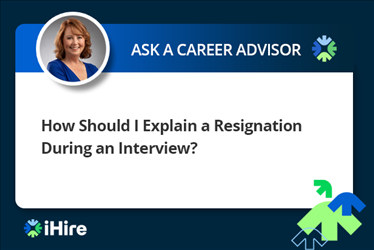- Job Seeker Resources
- |
- Last Updated: September 07, 2023

Ask a Career Advisor: How Should I Explain a Resignation During an Interview?
A common question you’ll encounter on job interviews is, “Why did you leave your last position?” Employers ask this to understand your career timeline better, determine whether or not you left for a good reason, and gauge your attitude toward your previous position and employer.
If you’re unsure how to explain leaving a job voluntarily or which common reasons for resignation are appropriate to use, read on for expert advice from Lori Cole, iHire Career Advisor.
“First, know that voluntarily leaving a position is unlikely to set off major red flags, especially during today’s ‘Great Resignation,’” said Cole. In fact, iHire’s latest Talent Retention Report shows 31.4% of survey respondents voluntarily quit between September 2020 and September 2021. Per the Bureau of Labor Statistics, 17.4 million Americans resigned from their jobs between August 2021 and November 2021.
“However, it’s still important to know how to explain a resignation during an interview in a way the hiring manager will understand and accept as reasonable,” Cole continued. “If done correctly, you can answer this question in a way that focuses on the positive aspects of your career and why you’re a great candidate for their open position.”
Common reasons for resignation include:
- The company culture didn’t align with your values
- You were stuck in a toxic environment stemming from bosses or coworkers
- There was a lack of training or career advancement opportunities
- Your compensation was low/not in line with market rates
Interviewers will likely want to dig deeper, so it’s important that you anticipate follow-up questions and practice your responses.
“Be honest, keep it brief, and stick to the facts when structuring your answer,” Cole recommended. “Don’t go into great detail – especially if those details could cast you in a negative light – and always put a positive spin on your answer that ultimately focuses on the future, not the past.”
Job Seeker Sign In
As you prepare and practice how to explain resignation, ask yourself the following questions:
- What was your previous position or workplace lacking?
- What positive things could you say about your last job, manager, coworkers, or company?
- What about your prior role helped you identify your ideal position and work environment?
- What excites you about the possibility of working for their company?
Touching on each of these points will help you craft a confident and concise response. Here’s an example of how to explain leaving a job because of the company’s culture:
“In my last position, the company culture didn’t allow people to take full ownership of their projects and independently drive them to completion. I was fortunate to work alongside very talented people and learned a lot from them regarding data analytics, for example, but the structures in place made it challenging to expand my skills and learn how to find what I needed on my own. In my next position, I’m looking for a culture that supports a bit more autonomy as it relates to project management and getting the information I need to make smart business decisions, after I’m well-trained of course!”
Now that you know how to explain a resignation during an interview, brush up on your answers to other tough questions so you can ace your next interview and be one step closer to a rewarding career.

Originally Published: January 26, 2022
Sign In or Register to access all articles and insider tips for help in your job search.
Search for iHire Jobs
RELATED JOBS
SUMMARY: Originate various types of mortgage loans. Generate bank fee income by originating...
Retail LP Associate IIMarshalls At TJX Companies, every day brings new opportunities for growth, exploration, and...
Retail Loss Prevention DetectiveMarshalls At TJX Companies, every day brings new opportunities for growth, exploration, and...
Warehouse General Utility - 1st shift, rotating weekend scheduleAbbott is a global healthcare leader that helps people live more fully at all stages of life....
Membership ConciergePosition Summary As a Membership Concierge II, you will serve as a professional in account...
RELATED RESOURCES
Find the Right Job Faster
- Get personalized job matches sent to your inbox every day
- Connect directly with employers before your competition
- Advance your career with expert advice on interviewing, salary negotiation, and more
We value your privacy



